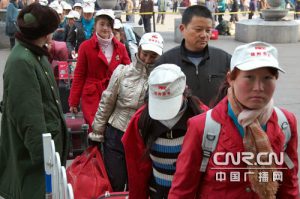Memo #217
By Kara Abramson – abramsonkara [at] gmail.com
 The March 2013 sentencing of 20 Uyghur men in Xinjiang, China, on terrorism- and separatism- related charges highlights ongoing frictions in China’s far west. Amid China’s media censorship and practice of conflating some peaceful resistance or ordinary crimes with terrorist activities, full details of these events remain unknown. What is clear is the persistence of ethnic tensions, also illustrated during protests and riots in the region in 2009.
The March 2013 sentencing of 20 Uyghur men in Xinjiang, China, on terrorism- and separatism- related charges highlights ongoing frictions in China’s far west. Amid China’s media censorship and practice of conflating some peaceful resistance or ordinary crimes with terrorist activities, full details of these events remain unknown. What is clear is the persistence of ethnic tensions, also illustrated during protests and riots in the region in 2009.
Frictions are unsurprising, as Uyghurs face harsh government policies and migration of Han Chinese into the area, with the proportion of Han rising from 6.7% of the population in 1949 to about 40% today. Often missing from the analysis, however, is the role that gender has played in ethnic tensions.
The 2009 events were connected to a fight over alleged sexual assault at a Guangdong factory employing Han and Uyghur migrant labourers. Han alleged that Uyghur men raped or harassed a female Han factory worker. Uyghurs claimed that Uyghur women faced harassment on the shop floor, and also voiced broader grievances at the state-sponsored labour programs that bring young Uyghur women to work in factories in China’s coastal cities. Some Uyghurs expressed fears that women were forced to participate in the labour programs and could end up marrying Han men or working as prostitutes, acts seen as threatening Uyghur identity. Uyghurs in Xinjiang took to the streets to protest the government’s handling of the fight, and rioting later broke out. Multiple grievances were ultimately connected to the events, but fears about women’s virtue vis-à-vis outside ethnic groups served as a prime spur.
Concerns over women’s purity have been central to defining group boundaries across the world, especially as men have generally been the dominant drivers of ethnic and nationalist movements. Not all gender-related concerns, such as fears of intermarriage, implicate rights violations as defined in international standards. Nonetheless, they are often central to notions of group identity and survival. Gender issues have played an important yet often overlooked role in ethnic relations and ethnic tensions in Xinjiang.
About the Author:
Kara Abramson is a Visiting Fellow at the Institute for Advanced Studies on Asia at the University of Tokyo.
Links:
- “Gender, Uyghur Identity, and the Story of Nuzugum.” Journal of Asian Studies, Volume 71, Issue 04, November 2012 (by Kara Abramson)
- “China imprisons 20 Uighurs in far west Xinjiang on terrorism, separatism charges,” Associated Press(via Minneapolis Star Tribune), March 27, 2013.
- “China Unrest Tied To Labor Program,” Washington Post, July 15, 2009
- Tianshan Net, 新疆20名煽动分裂国家、策划暗杀干警等嫌犯获刑[20 Criminal Suspects in Xinjiang Punished for Crimes such as Inciting Separatism, Plotting Assassination of Police], March 27, 2013 (In Chinese).
- “China Unrest Tied To Labor Program,” Washington Post, July 15, 2009
Related Memos:
- See our other memos on China

Comments are closed, but trackbacks and pingbacks are open.